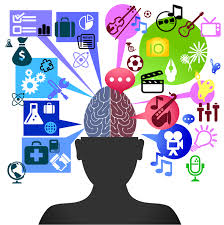Notes on 21st
Century/Shift Happens/Education Today and Tomorrow, Vision of K-12 Students/Growing up
Digital/P21st Learning
Just some notes and thoughts on 21st Century Learning......
As an educator preparing students for the 21stcentury is daunting but very exciting. Having the goals of the 21st century student always in mind as a teacher forces a teacher to examine their curriculum, teaching methods and assessments in light of how they will best prepare their students for their role in the future. Much of academia is still aligned with preparing students for a world that no longer exists, a world where many people worked in manufacturing as either worker drones or managers. It was okay for teachers to present the material as is and be satisfied with a bell shaped curve results of their students. Now each student must be prepared to be able to actively engage, transform, collaborate, critique, consume, produce and lead to be able to survive in the 21st century. I think this makes working in the field of education very challenging and exciting! The material I read from P21 encourages me to not just apply 21stteaching practices to certain material, situations or students but to guide all of my teaching each and every day to all students.
More honor students in China that total U.S. students?
That's a sobering thought, we need to go full speed ahead in the U.S!
Is Technology a pro or con for students?
The world is changing so much faster than in any other time in history – you can hardly catch your breath!
“Brains are rewarded not for staying on task but for jumping
to the next thing,” Michael Rich, associate professor at Harvard Medical School
– executive director of the Center on Media and Child Health in Boston. “Kids brains wired differently.”
“Computers are often used for entertainment, not learning,
particularly in low-income families”, Jacob L. Vigdor, economics professor at
Duke University. Knowing this piece of information, does this change how
students/teachers use technology in the classroom? It appears you can’t just hand out I-pads or
computers and expect them to be just used for learning.
A look at the “new social types… not the thespian and jock
but the “texter and gamer, Facebook addict and YouTube potato”
Student Sam Cocker, “Facebook is amazing because it feels
like you’re doing something and you’re not doing anything. It’s the absence of doing something, but you
feel gratified anyway.”
“My attention span is getting worse.”
“My attention span is getting worse.”
“Brains studies suggest to researchers that periods of rest
are critical in allowing the brain to synthesize information, make connections
between ideas and even develop the sense of self.”
University of California, San Francisco brain
scientists downtime is needed
“Downtime is to the brain what sleep is to the body” Dr.
Rich Harvard Med School
Synopsis and Notes
on P21 – Partnership for 21st century skills
Summary: “Holistic view of 21st century teaching
and learning, with focus on 21st century outcomes with innovative
support systems to help students master the multi-dimensional abilities
required of them in the 21st century.”
What is P21? – a national organization that advocates for 21st
century readiness for every student.
Fusing the 3Rs with the 4Cs (Critical thinking and problem solving,
Communication, Collaboration, and Creativity and innovation)

4 c’s Creativity,
Critical Thinking, Communication, Collaboration
Mastery of core subjects & 21st
century themes
21st century
interdisciplinary themes
Global awareness
Financial, economic, business and entrepreneurial
literacy
Civic Literacy
Health Literacy
Environmental Literacy
Learning and Innovation Skills
Creativity and Innovation
Critical thinking and Problem solving
Communication and collaboration
Information, Media and
Technology Skills
Information Literacy
Media Literacy
ICT (Information, Communications and Technology)
Literacy
Life and Career Skills
Flexibility and Adaptability
Initiative and Self-Direction
Social and Cross-Cultural Skills
Productivity and Accountability
Leadership and Responsibility
Thoughts on video spotlight “Going Places” – encourage thinking
outside of the box, collaboration, creativity, recognition of strengths (in
this illustration in the video the students’ ability to build something,
ability to dream up ideas) Link to video "Going Places"

